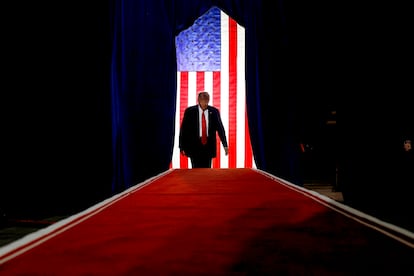Trump back in the White House: an abyss between the US, Europe and China
Polarization is very strong in the Republican party, which sees no alternative to blind support for the former president

“I have spent part of almost every day since November 8, 2016, pondering a single question: why did I lose?” Hillary Clinton confesses in one of her books. This may be even more likely to happen to Biden if he is finally the Democratic candidate for the next presidential election in November and if his opponent is Trump, in whom practically all analysts in the world only see tremendous defects and little that is positive in his ideas, his program and his personality. And yet, Trump seems to command the majority of “ordinary workers” in the United States.
His latest statements are alarming for Europe and China, the main competitors of the American empire. Trump has “encouraged” Russia to attack (European) NATO members that, in his opinion, do not spend enough on defense to sustain the Atlantic Alliance. He has told Putin he can do “whatever the hell he wants” with NATO allies who don’t meet their 2% defense spending commitment. As for China, he is threatening to raise tariffs on its export products again, as he did during his first term in office, even if this means lower growth for the American economy. A chasm could open up between the U.S., Europe, and China.
What explains the great chances of Trump returning to the White House despite his track record? The enormous polarization of the United States, which is an asymmetric polarization. More and more scholars are using the concept of “asymmetric polarization” to explain what is happening in many parts of the world: the extent to which not all actors have the same responsibility. In the American case, the most important change has occurred especially at one of its extremes: the Republican Party dominated by Trumpism. The political scientist Louis Miller, in the foreword to the book Why We’re Polarized, by the American journalist Ezra Klein, distinguishes three types of polarization. One is ideological — parties are increasingly homogeneous behind closed doors and increasingly different from one another. Then there is affective polarization — citizens experience greater attachment to the parties, leaders and voters with whom they feel more identified, and greater hostility toward those that do not share this affinity. It is not an ideological separation but an emotional one, which does not appeal to rationality but to feelings.
The third type of polarization is, perhaps, the least studied: social and territorial. There is a social, demographic and geographical differentiation that affects tastes, lifestyles and places of residence. In his book, Klein reflects on the procedures by which these three types of polarization have reinforced each other over recent decades, parties have become ideologically homogenized, positive and negative emotions have flooded political evaluations, and socio-spatial security has surged, so that citizens increasingly live in places where they share esthetic tastes, hobbies and ideology with their neighbors. This homogeneity leads to an increasingly distorted and caricatured opinion of those who think differently.
All in all, the worst possible scenario in the coming months would be a Trump victory that could endanger the foundations of democracy itself, as shown in the assault on the Capitol (and which is at the center of Putin’s strategy with Ukraine), accompanied by a Europe where if a critical mass of far-right parties enters the European Parliament, it could block a European response to problems such as globalization and a climate transition that is being called into question.
The Nobel Prize in Literature Elfriede Jelinek has written a speech in which she says: “I can hear a monster breathing, I hear democracy weakening… I hope it is not too late.” And meanwhile many citizens go around like sleepwalkers.
Sign up for our weekly newsletter to get more English-language news coverage from EL PAÍS USA Edition
Tu suscripción se está usando en otro dispositivo
¿Quieres añadir otro usuario a tu suscripción?
Si continúas leyendo en este dispositivo, no se podrá leer en el otro.
FlechaTu suscripción se está usando en otro dispositivo y solo puedes acceder a EL PAÍS desde un dispositivo a la vez.
Si quieres compartir tu cuenta, cambia tu suscripción a la modalidad Premium, así podrás añadir otro usuario. Cada uno accederá con su propia cuenta de email, lo que os permitirá personalizar vuestra experiencia en EL PAÍS.
¿Tienes una suscripción de empresa? Accede aquí para contratar más cuentas.
En el caso de no saber quién está usando tu cuenta, te recomendamos cambiar tu contraseña aquí.
Si decides continuar compartiendo tu cuenta, este mensaje se mostrará en tu dispositivo y en el de la otra persona que está usando tu cuenta de forma indefinida, afectando a tu experiencia de lectura. Puedes consultar aquí los términos y condiciones de la suscripción digital.









































